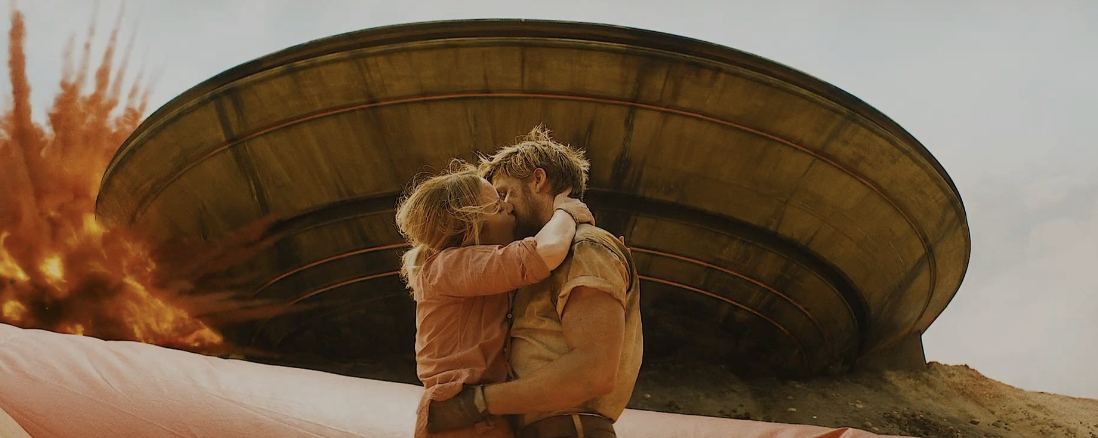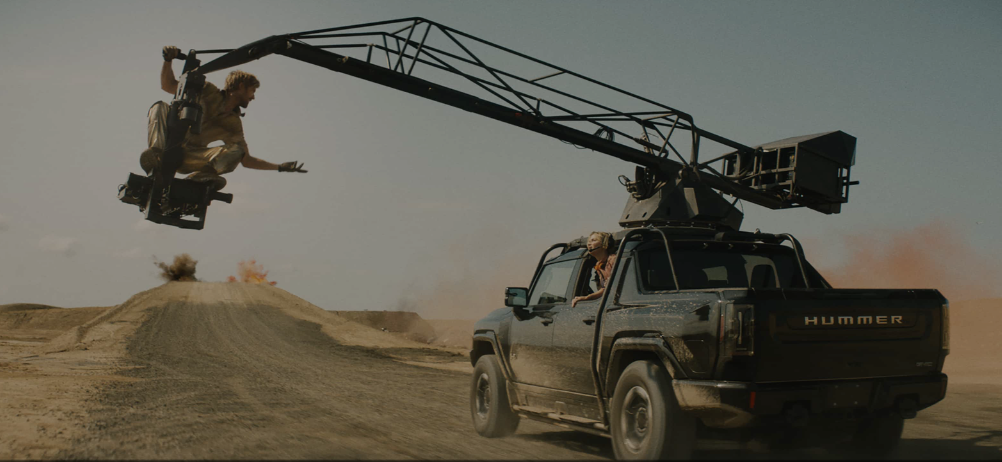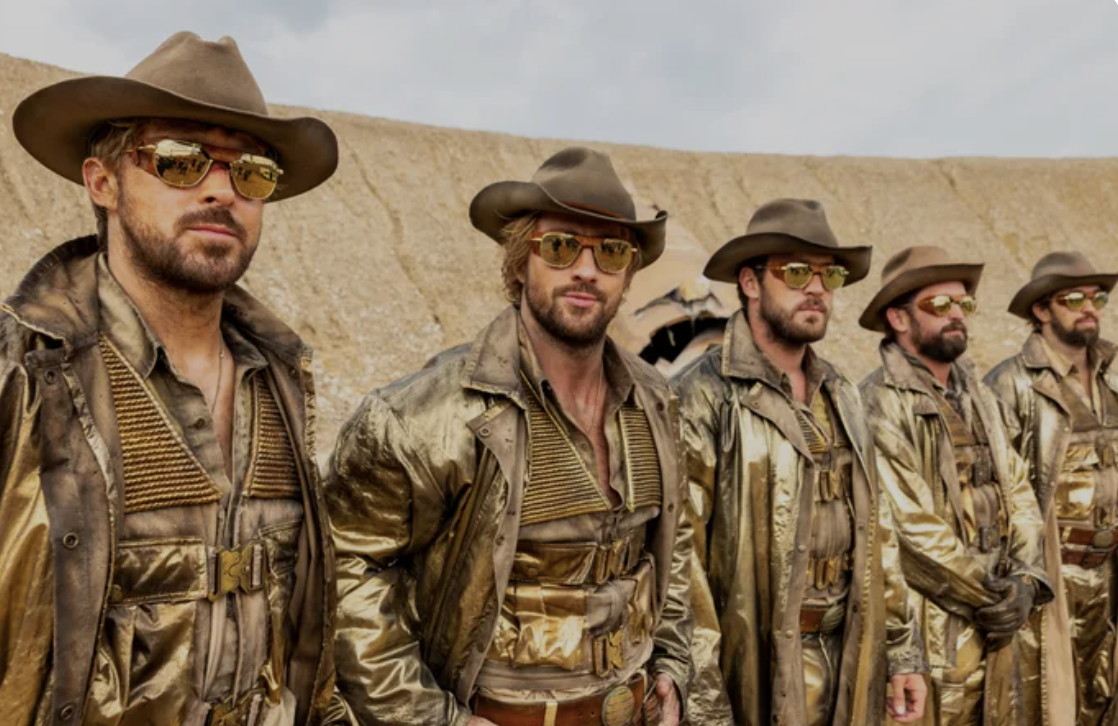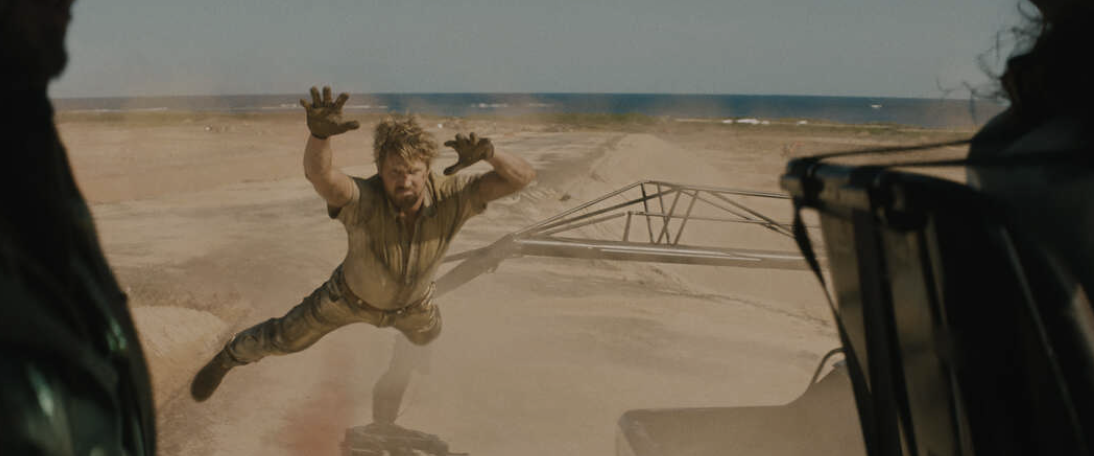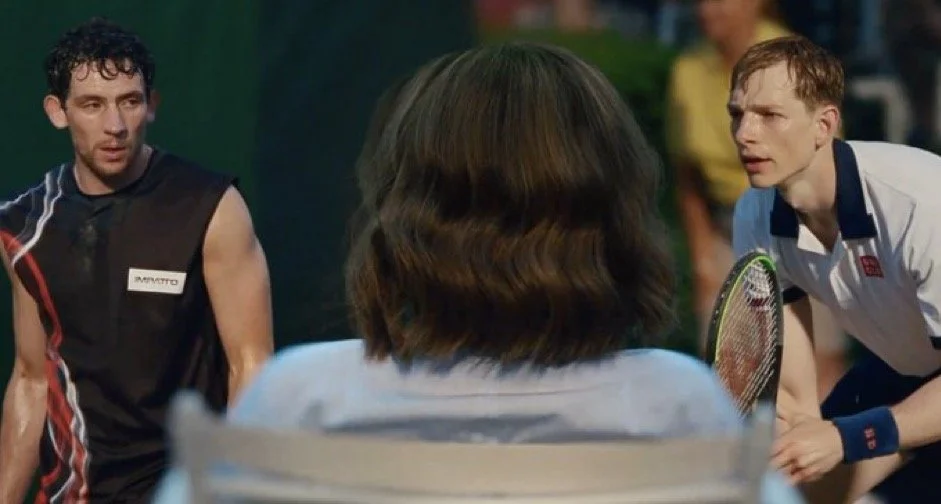The Stuntman Falls Hard for the Director — ‘The Fall Guy’ Review
Emily Blunt and Ryan Gosling in The Fall Guy. Courtesy of Universal Pictures.
What is more dangerous - falling for the stunt or for the one you love?
Former stuntman David Leitch’s newest film stars Ryan Gosling and Emily Blunt, whose charisma and magnetic appeal are no stunt. A meta-romantic-comedy action film that cleverly intertwines the making of intergalactic sci-fi Metalstorm, a hunt for the missing lead of the film using stunt skills in a film-like fashion, all placed within a rekindling love story between Gosling’s stuntman and Blunt’s director.
Emily Blunt and Ryan Gosling in The Fall Guy. Courtesy of Universal Pictures.
Colt Seaver, a decorated stuntman—as seen through aches and spotted bruises—must pull off his most daunting stunt yet—falling for Jody Moreno, camera-operator turned Gerwig-like director with whom he shared a fling filled with spicy margaritas and clever quips over two-way radios. Seaver answers the question “How far would you fall for the one you love in the pursuit of love?” by coming out of retirement to fall, flip cars, and take a hit to the wall for her directorial debut.
Their “cosmic otherworldly love” finds a setting in a sandy sci-fi landscape of aliens and space cowboys galore, with the plot of the movie sparing no detail of the unresolved feelings left within Jody’s heart. Where the alien and space cowboy end up during the remaining third act is to be determined by the progression of Colt and Jody’s reignited flame. Now, Jody has more to risk when falling for him and letting the split screen blur.
Ryan Gosling and Aaron Taylor Johnson in The Fall Guy. Courtesy of Universal Pictures.
Gosling continues to be the go-to for the effervescent and charming male lead, with comedic chops that refuse to undermine the endearing and heartwarming gaze which has become his signature. The film delivers epic action montages, car chase scenes, and guttural punches where Seavers can’t catch a break and must utilize his stunt skills to return Tom Ryder, the lead of Metastorm, back to set, who is portrayed by a laughably douchey boy-short wearing Aaron Taylor Johnson. Big prop guns and swords are soon made real when Colt Seavers realizes the high stakes involved in the “film,” which Hannah Waddingham’s Gale Meyer, producer to the stars, thrusts him into. Constant hits to the heart, chest, and credibility challenge the stuntman to remain unrecognized both on the set and in his life, which makes the character’s ascension to the leading role extremely satisfying to witness on the big screen.
Ryan Gosling in The Fall Guy. Courtesy of Universal Pictures.
The Fall Guy is founded on and thrives on an explosion of love. Love for the vitally underrecognized talents of stuntmen. Love for film, with scene-stealing Winston Duke’s stunt coordinator Dan Tucker taking any opportunity to empower the impassioned stunt set by quoting Rocky, Fast and the Furious, and Last of the Mohicans. Love for status and maintaining influence in the industry, as seen through the ever-protective producer who takes extreme lengths to protect the star at all costs.
And of course—a plot allowing the love of the alien and metallic-gold space cowboy to be the greatest stunt performed by Colt Seavers, who I imagine will give a thumbs up signifying his safety from matters of the heart.
Now Playing Only in Theatres
“The Idea of You” Review: A Woman’s Coming-of-Age Story
Classic coming-of-age stories, such as those of the ‘Princess Diaries’ and ‘The Devil Wears Prada’, feature Anne Hathaway as a heroine for a young woman’s transition into adulthood and embracing femininity. Her newest film serves as a similarly satisfying showcase for the actress, with the 40-year-old heroine Soléne Marchand’s coming-of-age story guised under a “charming boy-band fanfic”.
The actress adds complexity and a deep levity to the hearthrob-laden film, with scenes most poignant in moments of the effortlessly chic art curator’s acknowledgement of lost time meant to be self-invested. Marchand maintains a self-assured yet growth-pursuant nature throughout the film, one to redefine her world by finding comfortability and security in her identity. The manifestation of Soléne’s desire to reclaim the years of her motherhood-filled 20s arrives in the form of Hayes Campbell, the 24-year-old lead of the “so-seventh grade” boy band August Moon. Played with a suave and unimposing maturity by Nicholas Galitizine, the film undoubtedly utilizes Campbell as a vessel for the heroine’s self-discovery, which enables her to develop a love for his ability to revive her youth. Soléne allows herself to be swept up in the idea of him, envisioning a future where her life becomes romanticized with endless pleasures and wishes fulfilled.
Commentary on the idea and perils of celebrity pervade the film from the moment Hayes Campbell enters the Marchand Collective, which one can imagine Hathaway understands intimately. “Caught a cougar” becomes a headline that erupts the relationship between the pop star and Soléne; their love life becomes a source of fixation and intense scrutiny, heightened by an age gap displeasing to young fans and an unrelenting ex-husband. In a scene in which the heroine walks out of the car to be swarmed by paparazzi on her front lawn, one cannot help but envision Anne Hathaway saying “Calma” to crazed fans after the Valentino Show in Rome. Who she is as a celebrity and decades of experience with the endlessly-flashing lens bring a realness to her portrayal, who becomes a form of celebrity by association with Hayes. Anne Hathaway’s gracious triumph over the impossibilities of stardom gives life to Soléne Marchand and her own liberating reinvention chronicled throughout the film.
And yeah, there’s some catchy boy-band songs, too.
Now Streaming on Amazon Prime
‘Challengers’ Review: A Love Game
Mike Faist, Zendaya, and Josh O’Connor in Challengers. Courtesy of MGM.
Tennis complicates matters related to love. Luca Guadagnino’s latest film, Challengers, places Tashi Duncan, Art Donaldson, and Patrick Zweig in a 13 year match set at a score of zero-zero, with the tennis phenom’s ‘little white boys’ competing for her love, which only resides in the game.
Trent Reznor and Atticus Ross’ sexual and sense-stimulating score adds a pulse and rush of adrenaline to the film, creating a sense of urgency for the high stakes with each competitively manipulative rally of emotion and betrayal manifested into physical form by a green ball. Not to be understated is the potential for the score to be the next irresistibly hip-shaking club anthem beyond its principal purpose of driving the story through sound.
The slow ascension to the 2019 New Rochelle Challenger match between Art and Patrick, which opens the film, is excruciatingly painful to wait for, but worth the wait in a perfectly executed and satisfying third ‘set’. With a narrative timeline shifting back and forth from the origins of the three-turned-love triangle to the tortuous implications of their lives remaining intertwined, the film enters the minds of the characters, who remain self-defined and shaped by the past.
Love means nothing in tennis, and even less to Tashi Duncan in her relationships with Art and Patrick, playing a game where the ball is hers to serve. With footwork that made a tennis player in the audience exclaim her potential to actually play in real life, Zendaya commands the screen from the moment we and the two challengers meet Tashi at the ‘06 US Open. Eagerly exchanging turns for kisses in a hotel room fully under the control of Tashi escalates into years-long puppeteering and cunning edging that shatters the partnership of Art and Patrick. Fiercely relentless and imbued with graceful confidence, Duncan becomes tennis's best friend as two opposing players vie for her gaze.
Following a torturous argument between Tashi and Patrick, then a young couple, the delighted Art (who succeeded in his mission to divide the two) places his hand on the chair reserved for Patrick, ushering Tashi to the side of her career-ending injury and into the role of her unreciprocated lover. Tashi painfully shifts from the role of player to coach, investing in Art’s game and shaping the presently-married couple as game changers in the tennis world.
Mike Faist portrays Art Donaldson with longing glances and eyes seeking approval, revealing the character’s desire not for winning the game but Tashi. Realizing that he’s a part of her ‘fan club'—and may possibly be the most devoted member—Tashi allows Art to exist in her world as a vessel for their collective wins. She is Jesus to Art, and he is a dutiful disciple that never meets her eye, intentionally positioned below her in every frame of Challengers, subservient, and at her will. Who Art is to Tashi if not for tennis is nothing, and his awareness of the game being their only true connection causes him to stay long after his passion fades.
Josh O’Connor owns the film, embodying desperation masked by an inherent suaveness in Patrick Zweig, the ‘oddball’ of the trio, who is immediately distinct through a singularly unusual serve and his stagnant life trajectory. Patrick’s ability to understand Tashi’s mind games enables him to confidently stand tall and challenge her stature, viewing himself as a peer who is owed respect regardless of the lack of accolades attached to his name. An unchanged man who resorts to destructive old habits and has full awareness of his bad-boy behavior almost entices you to wish the worst for the character. Yet, O’Connor’s mastery of humanizing morally challenged characters results in Patrick Zweig’s annoyingly irresistible likability alongside a smirk that ascends the film to a grand slam. Both men satisfy the duality of Tashi’s lustful longings: one defining his identity in her desires, and another whose attractiveness stems from a dirtiness-free refusal to live out her blueprint.
Under the lens of cinematographer Sayombhu Mukdeeprom, the swift movement of the camera left-to-right during matches on and off the court mimics the raw speed and motion of the ball as it flies above the net. The stillness of the camera during pivotal moments in the film highlights the physical acting and calculated body movement that supersede dialogue within the film. The exclusive language of tennis is most impactful during the final match between Art and Patrick, who communicate through expressive grunts, old signals, and gazes to Tashi for her nod of recognition. Whether words or rackets are being flung around, the vibrancy of color and movement make Challengers a stylish, intentional, and electric film.
Tashi is positioned as the net in between Art and Patrick during the final moments of Challengers, in a love game of endless hard-hitting rallies.
Now Playing Only in Theaters.

